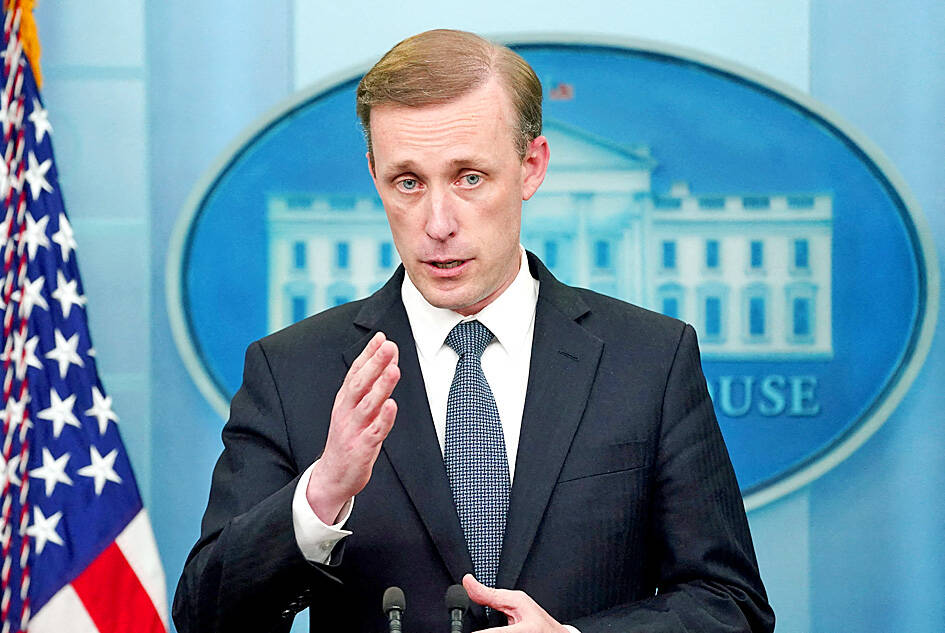US, Japanese and South Korean officials on Thursday discussed their joint commitment to peace and stability across the Taiwan Strait and other regional security topics at a trilateral meeting in Hawaii, a White House statement said.
Moreover, there would be no soft response from the three countries if North Korea were to hold a nuclear weapons test, Yonhap news agency yesterday cited South Korean National Security Office Director Kim Sung-han as telling his US and Japanese counterparts.
The comment came amid signs the North has completed preparations to conduct its first nuclear test since 2017.

Photo: REUTERS
“If North Korea conducts its seventh nuclear test, the response will be clearly different from the past,” Kim told Yonhap reporters on Thursday.
“We have agreed there should never be such a complacent thinking or response that North Korea has conducted just another nuclear test in addition to the six tests it did,” Kim said.
North Korea has conducted missile tests at an unprecedented pace this year.
In the middle of last month, it fired two cruise missiles from the west coast after South Korea and the US resumed their largest field exercises in years.
Pyongyang has long denounced them as a rehearsal for war.
During Thursday’s talks, the three officials also agreed to cooperate on global supply chain issues, while Kim separately raised concerns over new US rules on subsidies for electric vehicles, South Korea’s presidential office said.
Kim said after a bilateral meeting with US National Security Adviser Jake Sullivan the previous day that Washington has promised to review the impact of the new rules after Seoul raised concern they could hurt South Korean automakers.
Separately yesterday, Pyongyang accused the newly appointed UN special rapporteur on North Korean human rights of being a “puppet of the US” and making “unpardonable reckless remarks” against the regime.
The accusations came as the new rapporteur, Elizabeth Salmon, visited Seoul on her first trip since being appointed to the role last month.
Salmon, a Peruvian professor of international law, has had a series of meetings with South Korean officials and civic group members to discuss the situation in the North since arriving earlier this week.
“We had already made clear our principled stand that we neither recognize nor deal with any ‘special rapporteur’ who is merely a puppet of the US,” said an unnamed spokesman for the North Korean Ministry of Foreign Affairs in an English-language statement carried by the official Korean Central News Agency.
The spokesman said the rapporteur’s activities were cover for a US smear campaign against the North, accusing Salmon of daring to make “unpardonable reckless remarks encroaching upon our inviolable system and sovereign rights.”
“The UN should no longer allow its name and mission to be misused for the US hostile policy” toward North Korea, he said.
The UN established the position in 2004 as international concerns grew over allegations of human rights abuses in the North.
None of the special envoys have been granted access to the country for a fact-finding mission.

DAREDEVIL: Honnold said it had always been a dream of his to climb Taipei 101, while a Netflix producer said the skyscraper was ‘a real icon of this country’ US climber Alex Honnold yesterday took on Taiwan’s tallest building, becoming the first person to scale Taipei 101 without a rope, harness or safety net. Hundreds of spectators gathered at the base of the 101-story skyscraper to watch Honnold, 40, embark on his daredevil feat, which was also broadcast live on Netflix. Dressed in a red T-shirt and yellow custom-made climbing shoes, Honnold swiftly moved up the southeast face of the glass and steel building. At one point, he stepped onto a platform midway up to wave down at fans and onlookers who were taking photos. People watching from inside

A Vietnamese migrant worker yesterday won NT$12 million (US$379,627) on a Lunar New Year scratch card in Kaohsiung as part of Taiwan Lottery Co’s (台灣彩券) “NT$12 Million Grand Fortune” (1200萬大吉利) game. The man was the first top-prize winner of the new game launched on Jan. 6 to mark the Lunar New Year. Three Vietnamese migrant workers visited a Taiwan Lottery shop on Xinyue Street in Kaohsiung’s Gangshan District (崗山), a store representative said. The player bought multiple tickets and, after winning nothing, held the final lottery ticket in one hand and rubbed the store’s statue of the Maitreya Buddha’s belly with the other,

‘NATO-PLUS’: ‘Our strategic partners in the Indo-Pacific are facing increasing aggression by the Chinese Communist Party,’ US Representative Rob Wittman said The US House of Representatives on Monday released its version of the Consolidated Appropriations Act, which includes US$1.15 billion to support security cooperation with Taiwan. The omnibus act, covering US$1.2 trillion of spending, allocates US$1 billion for the Taiwan Security Cooperation Initiative, as well as US$150 million for the replacement of defense articles and reimbursement of defense services provided to Taiwan. The fund allocations were based on the US National Defense Authorization Act for fiscal 2026 that was passed by the US Congress last month and authorized up to US$1 billion to the US Defense Security Cooperation Agency in support of the

‘COMMITTED TO DETERRENCE’: Washington would stand by its allies, but it can only help as much as countries help themselves, Raymond Greene said The US is committed to deterrence in the first island chain, but it should not bear the burden alone, as “freedom is not free,” American Institute in Taiwan Director Raymond Greene said in a speech at the Institute for National Defense and Security Research’s “Strengthening Resilience: Defense as the Engine of Development” seminar in Taipei yesterday. In the speech, titled “Investing Together and a Secure and Prosperous Future,” Greene highlighted the contributions of US President Donald Trump’s administration to Taiwan’s defense efforts, including the establishment of supply chains for drones and autonomous systems, offers of security assistance and the expansion of